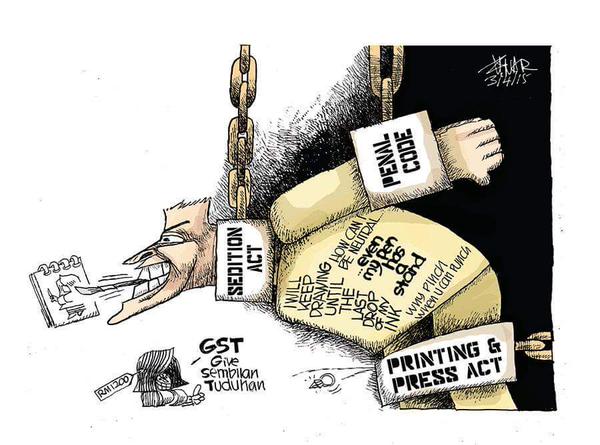
Malaysian cartoonist Zunar was charged for sedition for this cartoon.
The Malaysian government is cracking down on a local cartoonist for criticizing the government, charging Zulkiflee Anwar Alhaque, better known as Zunar, with nine counts of sedition for drawings shared on Twitter.
The satirical cartoons, posted in February, mocked the country’s judicial system after the conviction of opposition leader Anwar Ibrahim for sodomy. The politician’s arrest is widely viewed as an attempt to shut down his three-party political alliance, which has been making inroads against the existing leadership, solidly in power for over five decades.
“This is a record, being charged nine times and using the sedition law,” said Zunar’s attorney, Latheefa Koya, of his client’s charges in a statement. “It is excessive and targeted at silencing vocal critics.”
One of Zunar’s caption read “the lackeys in black robes are proud of their sentences. The rewards from the political masters must be plenty.” In another, he claimed that “today Malaysia is seen as a country without law.”
The nation’s sedition laws date from the colonial era, and outlaw promoting hatred of the government. The government has recently been enforcing such laws with renewed vigor, clamping down on free speech. A conviction could see Zunar placed behind bars for 43 years if he is found guilty on all counts.
Zunar at court.
Photo: Fazry Ismail, courtesy EPA.
Politically-charged cartoons also motivated the terrorist attack on the Paris office of French satirical magazine Charlie Hebdo (see 12 Killed at Magazine Previously Attacked for Satirical Cartoons), and the attempted assassination of Swedish cartoonist Lars Vilks (see Who is Swedish Cartoonist Lars Vilks, Targeted by Jihadists in Copenhagen Shooting?). Both were targeted due to their artwork depicting the prophet Muhammad.
Though support for Charlie Hebdo was widespread following the massacre (see #JeSuisCharlie: A Digest of Responses to the Killings at Charlie Hebdo and French Art Institutions Unite in Support of Charlie Hebdo), there has also been fear of reprisal, leading to the cancellation of a museum exhibition and cartoon convention (see Belgian Museum Cancels Charlie Hebdo Exhibition and French Cartoonist Conference Cancelled Amid Fears of Attacks), and censorship (see Accused of Charlie Hebdo Censorship, AP Removes Piss Christ Image and Security Threats Force London’s V&A to Remove Prophet Muhammad Artwork).
Cartoons have also made waves on social media, with Instagram censoring a drawing supporting the “free the nipple” campaign (see Instagram Apologizes to Artist Over Topless Cartoon Ban).
“They are really trying to shut me off from criticizing the government, so I think it’s clearly politically motivated,” Zunar told the press. He showed up at his court hearing wearing a mock prison jumpsuit, and made light of his legal troubles by posing for photographs with a pair of handcuffs.
Malaysian cartoonist Zunar drew this in response to charges of sedition filed against him.
The artist’s latest cartoon is a self portrait: Zunar is handcuffed and chained by the neck and legs by the “penal code,” “sedition act,” and “printing & press act,” but, despite the restraints, continues to draw using his mouth. In his Tweet, the cartoonist pledged to draw “until the last drop of ink.”
New York-based Human Rights Watch sees the charges against Zunar as part of a troubling trend in the country. In a statement, it said, “Day by day, Malaysians are losing more and more of their rights and democracy at the hands of an increasingly oppressive government.”